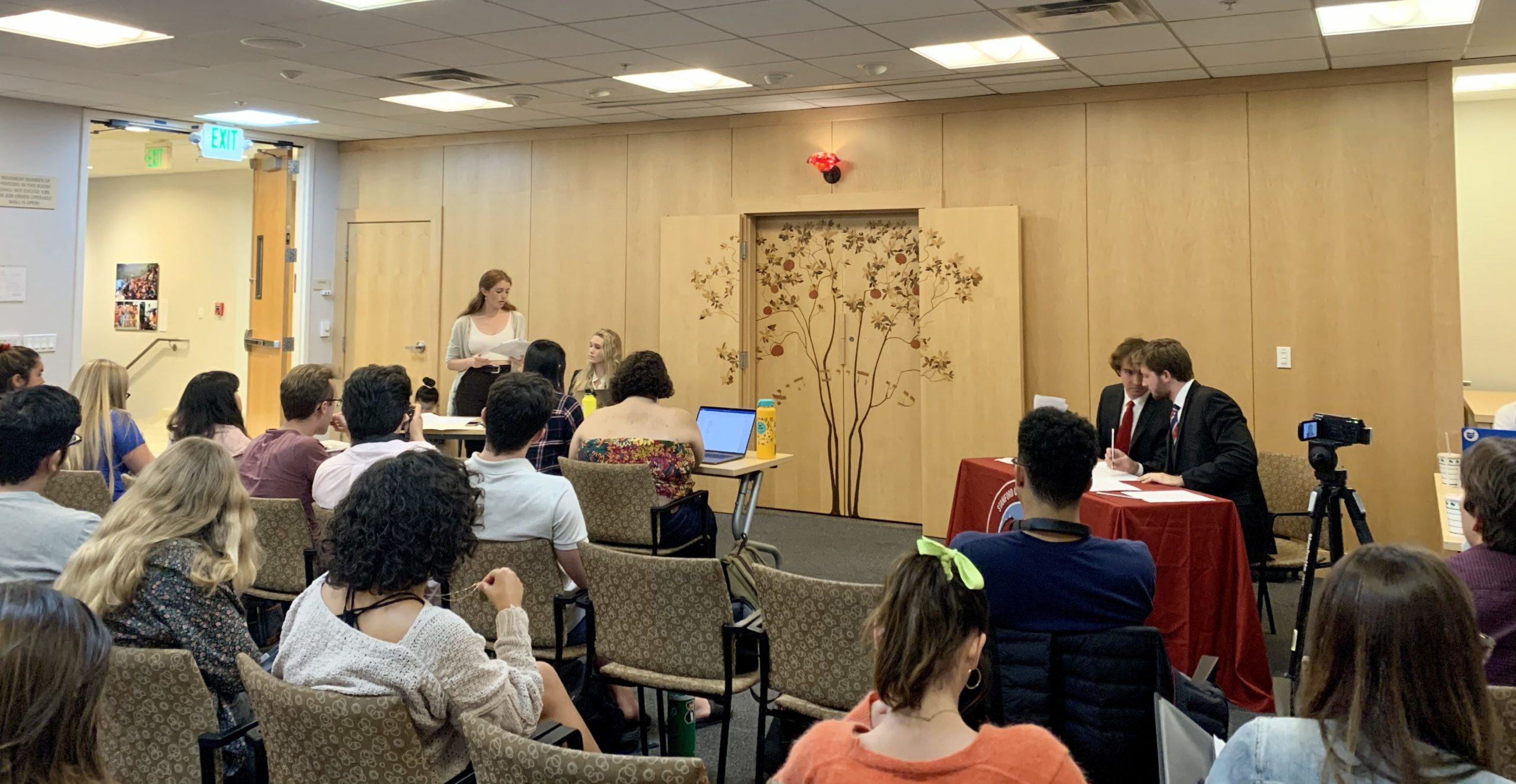After Stanford in Government’s (SIG) winter-quarter immigration debate between the Stanford Democrats and the Stanford College Republicans (SCR) led to controversy, SIG is reconsidering the format of its policy events.
SIG, which has hosted several debates between Stanford Democrats and SCR, is now considering shifting its policy events away from structured debate and toward a more discussion-based format, according to SIG Chair Natasha Moolji ’20.
Moolji ascribed the impetus for discussion of debate terms to a combination of a dispute over SCR’s publication of a video of the immigration event — fueling worry that debaters could be doxxed — and student concerns over the nature of the debate.
SIG had come under fire for giving SCR a platform for its right-wing views on immigration.
“Members of our community were upset about the platforming of SCR,” said SIG Vice Chair of Programming Elena Crespo ’20. “We’re committed to uplifting the voices of all members of the community, and we are especially sensitive to the impact of policy because policy touches the lives of people, especially black and brown communities.”
SCR Vice President Jose Luis Villarreal ’22 said SCR’s participation in events was necessary for open dialogue.
“If people are saying, ‘Don’t give [SCR] a platform,’ then they’ll never hear the other side,” Villarreal said. “Both sides will polarize even more, leading to a toxic political culture.”
Moolji said SIG would continue to discuss future programming and suggested a panel discussion with “multiple perspectives” and “faculty presence” as an alternative to debates. The debate format, Moolji said, could lead viewers to believe speakers were representing their personal views, which might disincentivize participation.
“It’s not as popular to be a conservative on Stanford’s campus, so there might be some fear associated with [debating publicly],” Moolji said. “On the other hand, when you have a really personal stake in the matter, and you feel like your livelihood or safety will be threatened if you express certain viewpoints, you’ll also be disinclined to participate.”
The debate format does not necessarily lead to productive discussion, Moolji added.
“It’s easy to go for catchphrases or one-liners that get the crowd really excited,” she said. “But that doesn’t necessarily help us get to the heart of the issue or engage in the kind of nuanced policy discussions that we’re really interested in having.”
Villarreal said SCR would accept a policy discussion format, provided that conservative viewpoints continue to be represented.
“The structure doesn’t worry us as much as the content of the debate,” Villarreal said. “Our only concern is that oftentimes with panels, you get more pointed questions toward one side than the other, and debates were a good way to level the playing field. If SIG figures out a way to do this correctly, we’d be open to participating.”
Debate video goes public
After the immigration debate, SCR published a video of the event on its Facebook page. Stanford Democrats raised concerns that the debaters could be doxxed, according to Moolji. Moolji said that while SCR had permission to film the debate, they did not have permission to upload the video without the participants’ consent.
SCR signed SIG’s “Code of Conduct,” pledging to “not publicly release personal identifying information (e.g. pictures, videos, address, email, online accounts, phone number) of students/any Stanford affiliates without their consent.”
The document also states that “if any member of the organization fails to adhere to the Code of Conduct for Civil and Productive Discourse, SIG’s partnership with the whole organization may be reconsidered or retracted.”
Villarreal said that SCR did not consider including the debaters’ faces in the video to fall within the contract’s mention of “personal identifying information,” as SCR did not name the Stanford Democrats debaters.
In an email to SIG members negotiating the debate’s terms, SCR President Stephen Sills ’22 requested that SCR “be granted rights to record the event as before.”
A SIG leader replied that “meeting those terms should be no problem, given SCR abides by the rules we went over for the previous debate (namely that the use and publication of the footage be used in no defamatory or ill-mannered way).”
Villarreal said recording debates was part of traditional agreements between SIG and SCR.
“We believe that they had always agreed to having it uploaded,” Villarreal said.
Stanford Democrats’ leadership and debate participants did not respond to multiple requests for comment.
A previous version of this article misspelled Jose Luis Villarreal’s surname. The Daily regrets this error.
